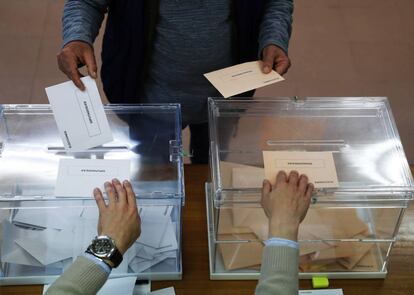How abstention could affect the results of a repeat general election
Some experts argue that leftist parties are more likely to be hurt by voters’ frustration at having to return to the polls for the fourth time in four years

The abstention rate is likely to be a deciding factor in the results of a repeat Spanish election. If Spain does head to the polls on November 10, as is expected, the outcome of the vote may be less fractured if there is a significantly lower voter turnout. Some experts argue that this will hurt left-wing groups such as the Socialist Party (PSOE) and Unidas Podemos (a coalition between Podemos and the United Left), while others argue it will concentrate the vote more equally between the left-wing and right-wing blocs.
We are seeing greater disengagement now, and it is distributed equally between the left and the right
Belén Barreiro, head of the research company 40dB
Spain is closer than ever to its fourth general election in as many years, after its political parties failed to reach a governing deal in the wake of the inconclusive April 28 polls. Despite months of negotiations, the PSOE, which won most seats at the April vote but fell short of a majority, has not been able to reach an agreement with any political party that would allow its leader, Pedro Sánchez, to be voted back into office as prime minister by deputies in Congress.
Each political party is likely to spend a large part of their election campaign on blaming their adversaries for the repeat elections. Voters tend to punish the political leader whom they see as responsible by either voting for a different party or abstaining.
The only other time Spain has held a repeat election – in June 2016, after the failed attempt by Mariano Rajoy of the right-wing Popular Party (PP) to be voted back in as prime minister – turnout fell marginally from 73.2% to 69.8%. But the decrease could be greater in November, although it will only be decisive if some parties are punished more than others. “Generally, we are seeing greater disengagement now, and it is distributed equally between the left and the right. The question is whether this trend will remain stable over the next few days,” says Belén Barreiro, the head of pollster 40dB.
According to Barreiro, the level of disengagement will be highest among young Spanish voters, who mobilized significantly for the April 28 general election and voted mainly for the PSOE. But Barreiro says it is important not to jump to conclusions, explaining that there are many factors that could affect the results.
At the repeat election in 2016, voter participation fell from 73.2% to 69.8%
Antonio Asencio, the communications director at market research company Sigma Dos, agrees that the situation is complex. “We have to take into account two factors. Firstly, whether the abstention rate is distributed uniformly or if it is concentrated against certain parties. This could considerably change the structure of the vote, with swings of up to four points toward or against some parties. The second issue is that, if there is a sharp decline in participation, the parties that successfully retain more voters, even if they lose votes in absolute terms, could increase their percentage [of the vote],” he explains.
According to Asencio, political parties will now launch “a very strong battle to control the narrative” over who is to blame for the repeat elections.
The research company Ipsos reported on Tuesday that 60% of voters are against returning to the polls. “It is likely that those who don’t want [a new election] to happen will not vote,” says Ipsos expert Vicente Castellanos, adding that low voter turnout does not tend to have a big impact on the leftist parties, given that most people in the country define themselves as center-left. “The right-wing voters mobilize earlier and in a more disciplined way. And in this case, they have a strong reason to vote because there is the option of change,” says Castellanos.
Other experts are more certain that leftist parties will see a fall in support. José Ramón Lorente, the head of polling company Celeste-tel, says that in the last voter-intention survey carried out by the government’s Center for Sociology Research (CIS), one-third of voters were in favor of a coalition government between PSOE and Unidas Podemos. He argues that unlike in 2016, when voters punished to a large extent Unidas Podemos, this time the PSOE and its leader Pedro Sánchez may also be hurt by low voter turnout: “The abstention rate on that occasion hurt [Podemos leader] Pablo Iglesias. But now those on the left can blame either one.”
English version by Melissa Kitson.
Tu suscripción se está usando en otro dispositivo
¿Quieres añadir otro usuario a tu suscripción?
Si continúas leyendo en este dispositivo, no se podrá leer en el otro.
FlechaTu suscripción se está usando en otro dispositivo y solo puedes acceder a EL PAÍS desde un dispositivo a la vez.
Si quieres compartir tu cuenta, cambia tu suscripción a la modalidad Premium, así podrás añadir otro usuario. Cada uno accederá con su propia cuenta de email, lo que os permitirá personalizar vuestra experiencia en EL PAÍS.
¿Tienes una suscripción de empresa? Accede aquí para contratar más cuentas.
En el caso de no saber quién está usando tu cuenta, te recomendamos cambiar tu contraseña aquí.
Si decides continuar compartiendo tu cuenta, este mensaje se mostrará en tu dispositivo y en el de la otra persona que está usando tu cuenta de forma indefinida, afectando a tu experiencia de lectura. Puedes consultar aquí los términos y condiciones de la suscripción digital.









































